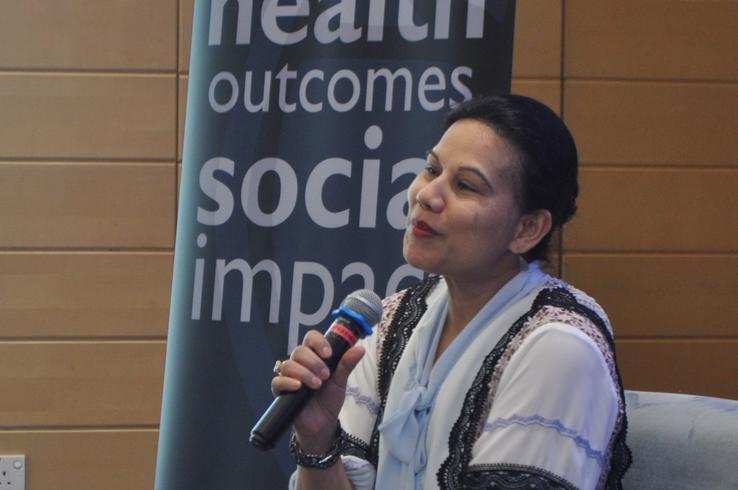KUALA LUMPUR, Oct 7 — Advocates have urged the government to start a fund to finance new cancer medicines unavailable in public hospitals, starting with RM5 million in Budget 2020.
They say the cancer drugs fund should grow to RM50 million over five years and should be managed by a committee of clinicians independent of the Health Ministry.
Over the years, scientific advances in cancer treatment have been significant, as cancer patients who obtain the right treatment are able to have better survival outcomes. The Healthcare Performance Measurement and Reporting System 2012 showed that 50 per cent of breast cancer patients could have been saved if they had received the right treatment at the right time.
The inclusion of new cancer medicines in public hospitals is slow, but patients do not have the luxury of time to wait. The government has stated that it lacks funds for new medicines, and this can be addressed through this special fund.
The initial money for the fund, according to Pantai Hospital head of oncology services Dr Mastura Md Yusof, can come from the government, with companies or individuals pumping in more cash in subsequent years.
“NHS has a very good and established system where they deliver drugs that are approved in their so-called blue book, but they have an extra £50 million for innovative drugs that are not within the NHS formulary that is to be considered on a yearly basis,” Dr Mastura told a recent forum organised by the Galen Centre for Health and Social Policy here on advanced breast cancer, referring to the United Kingdom’s Cancer Drugs Fund that began with a six-month £50 million government allocation in 2010.
“That is the UK. For Malaysia, I would say RM50 million just for innovative drugs.”
The UK’s redesigned Cancer Drugs Fund financed drugs that were temporarily approved by the NHS rationing body, the National Institute for Health and Care Excellence (NICE), usually for about two years. Those were medicines that NICE considered promising, but whose benefits and value for money were not yet proven. NICE could gather more evidence during that time and then make a final decision on whether or not to recommend that NHS routinely pay for those treatments.
Dr Mastura said a new cancer drugs fund in Malaysia should cover patients in the public sector as they are the ones truly in need, and junior oncologists in government hospitals need to be familiar with innovative medicines.
“If we’re not used to using the drug, we may not even think about it,” said Dr Mastura, who previously worked in Ministry of Health (MOH) and university hospitals.
She told CodeBlue at the sidelines of the forum that for middle class Malaysians, the M40, drugs financed by the cancer fund could be provided to them through co-payments, with the proportion of payments by the fund and patient depending on one’s ability to pay.
Dr Mastura also said organisations like zakat institutions and the National Cancer Council (Makna) could channel their aid for cancer patients to the cancer drugs fund instead, claiming that zakat bodies sometimes paid for alternative therapy by as much as RM40,000.
“Zakat can be told that, if you have money, let’s say you allocate RM2 million for cancer patients, give to the fund lah.”
She added that the cancer drugs fund could also pay for services like next-generation sequencing treatment at a good rate from private hospitals, since the waiting time at public hospitals could be long.
The cancer drugs fund committee, she said, should comprise doctors from MOH, university hospitals, and private hospitals.
The Galen Centre for Health & Social Policy, secretariat for the Cancer Care Working Group which works to improve cancer policy, supports the establishing of a RM50 million seed fund for cancer treatment financing to encourage private sector ringgit-to-ringgit contribution. It recently stated that this could be a form of public-private-patient partnership where the government, private sector and patient co-pay for cancer treatment to increase the availability and quality of existing treatment options.
National Cancer Society Malaysia (NCSM) medical director Dr M. Murallitharan said a fund to finance new cancer treatments in Malaysia would not be a new practice, pointing out that the previous Barisan Nasional government once had a specific fund to pay for rare disease drugs.
“There should be a separate fund parked for access of innovative treatment,” Dr Murallitharan told the forum.
“An overall budget increase will of course be beneficial for everyone, but if we’re talking strictly about innovative treatment access, you probably need an earmarked kind of source.”
Dr Muralli said RM5 million would be a good start for the cancer drugs fund, adding that it could operate through co-payments for both the bottom 40 per cent of income earners (B40) and the M40.
He suggested that the fund cover 60 per cent of the treatment cost for the B40, whereas subsidies for the M40 could range between 30 and 40 per cent.
The fund committee deciding which cancer drugs and patients to cover should comprise a mix of clinicians, MOH policymakers, and patient groups.
“It’s also important to have patient representation,” Dr Muralli told CodeBlue at the sidelines of the forum.
CodeBlue recently reported a study by Universiti Malaya associate professor of clinical epidemiology and public health Dr Nirmala Bhoo Pathy that found almost two-thirds of cancer patients at University Malaya Medical Centre (UMMC) ran into financial catastrophe one year after their cancer diagnosis. The university hospital later defended the cost of its cancer treatments, saying that it provided the latest drugs like immunotherapy that were unavailable in MOH facilities.









